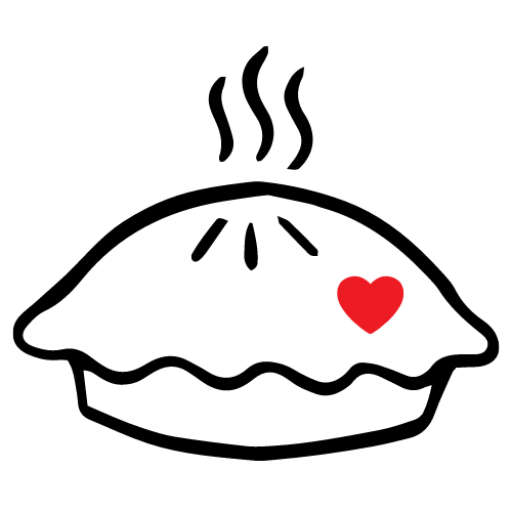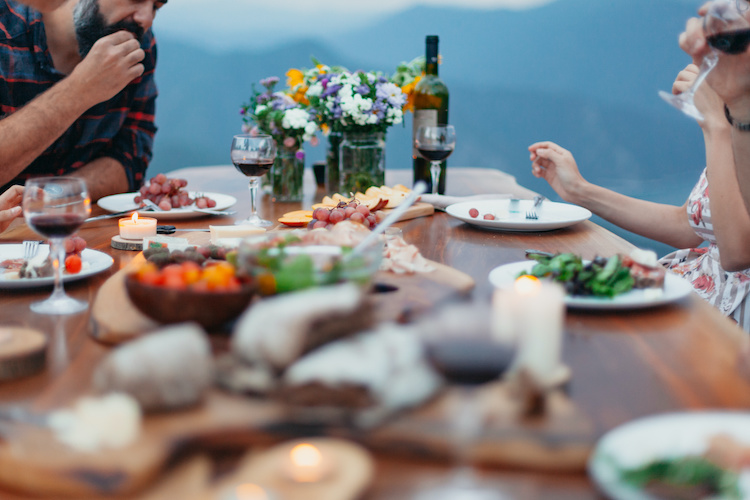The hospital corridors were quiet and empty that Wednesday morning before Thanksgiving in 2009.
I found my dad sitting up in his bed, his head turned away and staring out the window over asphalt rooftops in pale grey morning light.
His hands laid limp in the scrambled eggs on his tray, which was disturbing given how many times I’d watched his strong hands working to repair a bicycle chain, or car engine, or pound a nail or sweat pipes for a new hot water heater.
But he was awake and calm. This was a good, welcome change from the night before.
A euphoric relief after the last two weeks of sitting vigil beside his ICU bed, talking to him as he slept and doing whatever I could think of to yank him away from death. A beeping ventilator had breathed for him and strong drugs kept him unconscious while his body fought infection in his lungs and abdomen.
I’d pulled him with all my might. Prayed and hoped and pled with him. Now, I was exhausted.
I didn’t know how I would spend Thanksgiving the next day and, frankly, I didn’t care. Some things are more important than our Thanksgiving plans.
Next week, many millions of American families will spend Thanksgiving away from loved ones who they would normally see to help protect them. Staying home and understanding others’ decision to stay home, and helping those who will be alone — THIS is how we shall take care of each other this year, and it is beautiful.
THIS is how we show respect for the tremendous loss in our country of more than 252,000 mothers, uncles, grandmothers, aunts, sisters, fathers, brothers and children — and be thankful for who is healthy.
THIS is what we sacrifice now so we can hopefully see and hug everyone next year. Let’s prevent whatever loss and pain we can still prevent.
A Holiday Nightmare
When I quietly called my dad, he turned, recognized me and said, befuddled: “I’ve been damaged.”
Then it hit me: For these last two weeks, he’d slept through our nightmare. Our family — his long-time girlfriend, Stephanie, his brother and my sister and our moms, his ex-wives — could all exhale and celebrate. He survived. He was alive and awake. Everything was going to be OK.
But my dad’s conscious nightmare was just beginning. His body was full of medicine to knock him out and treat infection, and he had not had a normal sleep cycle in at least three weeks. On Monday, he came off the ventilator and surfaced from sedation and seemed OK.
Tuesday started just fine but by the afternoon, he believed the nurses were holding him hostage and kept trying to get out of bed and escape. My dad that Tuesday suffered from ICU psychosis — a temporary state of delirium, paranoia and anxiety caused by the sleep and stimuli disruption of the intensive care unit.
That Tuesday afternoon, he was physically restrained and moved to a regular hospital room. It had been awful.
So I was relieved to see him calm for breakfast Wednesday morning, and attempted to ease his confusion.
His brain had not caught up and could not make any sense of what was going on. He’d dreamed he’d crashed his car so much that that was real to him. For weeks, he was foggy and believed he’d suffered brain damage, no matter what anyone him.
I will never forget that Wednesday morning in Akron, Ohio, as gut instinct and adrenaline drove me to the hospital early. I knew I would soon hit the wall and had to drive myself back home to central Pennsylvania. But first I had to see him awake and calm, do what I could to re-assure him that he would be fine, his brain was not damaged, say goodbye for now and understand what would happen next.
A Clear Decision
This week, my mother-in-law said an amazing thing to me that took me right back to that Wednesday morning. (My mother-in-law, by the way, is an angel walking among us.)
She and I have talked about Thanksgiving plans many times this fall, and now the decision is clear — as it is for so many American families as the COVID pandemic surges, and breaks new records.
She and my father-in-law and sister-in-law will spend Thanksgiving at home about 20 minutes away instead of at our house, where they have been for the last seven years. This is disappointing — and for the best.
It’s OK to change Thanksgiving, she said. To move it. To re-schedule it until it’s safe to gather again. This is how we take care of our families and celebrate gratitude.
Look what you did that year your dad was in the hospital, she said. You moved Thanksgiving to February and this beautiful new tradition grew out of it. She knows my dad only through stories and our annual Thanksgiving in February dinner.
She’s exactly right.
And I was gobsmacked.
Sometimes, we’re so close to something we miss the obvious.
Finding Gratitude in the Dead of Winter
I often think about the life lessons from Thanksgiving in February, this true story of how my family-of-origin patched itself together first to take care of my dad and each other when he was hospitalized over Thanksgiving in 2009, then to celebrate together literally in the middle of February.
I love the symbolism of celebrating gratitude in the dead of winter, and I love exploring these themes of making peace, healing through family, gratitude, finding light in darkness, and holding each other up. I’m grateful for the readers who’ve joined me on this journey.
And yet — I’d missed the most obvious, most critical “Thanksgiving in February” lesson for right now: Health is more important than gathering for turkey and pie. (And trust me — I LOVE hosting Thanksgiving dinner.)
This week, I’ve watched public health experts on TV urging people to stay home for Thanksgiving. We can have Thanksgiving in March or Thanksgiving in April or June, they say.
Thanksgiving in February?! We’ll see. February may be too soon.
Nothing matters more than health and taking care of each other. Thanksgiving can be changed to work around that. It will be OK.
Never the Same
Because my dad’s illness in 2009 was horrible and awful and changed him. He recovered — yet never fully regained his strength.
And I rarely let myself wonder this — it doesn’t change anything and he and his loved ones suffered plenty — but nonetheless:
What if he’d prevented that illness? What if he’d sought a doctor before his appendix burst and left him with infection?
Would that have changed anything? Would he have been stronger to fight pancreatic cancer in 2012? Would he have lived and gotten to know my husband and stepsons? My beautiful family? Our life here?
Would he be here right now, sitting at my kitchen table, clinking his spoon against his coffee cup for a re-fill? And otherwise driving me crazy? Who knows.
What pain can we prevent?
The real, heart-breaking, peace-shattering tragedy of this year is the loss of more than 252,000 people. Some of those deaths were preventable.
Dr. Christopher Murray is the director of the Institute for Health Metrics and Evaluation at the University of Washington. Dr. Murray was the lead author on a study published in late October in the journal Nature Medicine — which means his work was reviewed and vetted by many other reputable, respected and credible scientists.
Research from Dr. Murray’s team showed that mask use can cut by half the risk of infection for individuals and the population.
Simply put: Mask-wearing can still save the lives of tens of thousands of people. The study (published here) estimates that if 95 percent of people wore masks in public, we could save more than 129,000 lives from the end of September to the end of February.
Now — this is an estimate, from a model that can vary depending on data used and what happens next week.
BUT let that sink in, because 129,000 is a big number of real people. If 95 percent of people wore masks in public, we could save tens of thousands of lives.
Why wouldn’t we do that?
Each of the people we have already lost had a story. Most died away from family. So much pain. Too much.
This will break some people. Some people will not recover.
(Oh – and for the people still saying more people die from the flu: Please stop the nonsense. The Center of Disease Control estimates 24,000 to 62,000 U.S. flu deaths in last year’s flu season.)

Fussing over Details? Guilty!
I know change is hard. I know it’s hard to let go of what we expect or envision from Thanksgiving. This is tradition. This is what we do.
Trust me, I get it. My dad’s serious illness changed me, too, and led to my obsession with two Thanksgiving dinners a year, a constant reflection on gratitude, family and peace — and a preoccupation with the details of hosting these gatherings.
Soon after his recovery, I started hosting. And now, my husband and I host Thanksgiving dinner for about 15 of our family in November and 25 or so in February. This year, it will be our immediate family, small and outside, if the weather cooperates.
I’m always fussing over details up until the last-minute. Getting the house ready. Finishing a painting project — or even knocking down a wall in our living/dining space the week before Thanksgiving. (Our contractor did that work.)
Envisioning how the table will look. One year, I had to anchor the centerpiece of fall squash and flowers in a rustic wooden toolbox. When it was done, I felt so much better.
Of course you did, my mom said, as she stirred brussels sprouts in the pan. No better symbol of your dad than an old wooden toolbox, she said.
Thank goodness my mom and my husband keep the dinner on track. This year, my mom and stepdad are also staying home to be safe. I’d better set the table early, so I can cook the Brussels sprouts.
Last year, I sort of body-blocked my mother-in-law just in time. She was about to set regular paper napkins on the table, instead of the proper, matching cloth ones. (Regular, paper napkins!) In the heat of the moment, I may have been a bit abrupt. When I apologized the next day, she said she had not even noticed.
(I’m telling you, she’s an angel walking among us.)
Odd crowd
A quirky twist of my family-of-origin’s Thanksgiving in February story is that we didn’t exactly re-schedule a dinner we normally had together. We just promised a big family Thanksgiving dinner to comfort my dad, who was still loopy on meds and stuck in the hospital over the holiday.
All those people never gathered for a Thanksgiving dinner until February 2010, when my dad had recovered. My dad’s longtime girlfriend hosted the first one at their home, and invited both my dad’s ex-wives (my mom and stepmother) and my mom’s husband. Not the typical November crowd.
In fact, I had not spent Thanksgiving with my dad in many years. We’d hardly spoken for 10 of those years.
When my dad was sick in the hospital that year, 2009, I’d been expected in Philadelphia to celebrate Thanksgiving with my then-husband and his family. We’d spent many fun Thanksgivings in Philly.
They went out to dinner, as I recall, but I didn’t make it to Philly until that evening.
Assured my dad was going to be OK and in good hands, that Wednesday I headed east for central Pennsylvania, got home, fed the cats and crashed on the couch.
Wilda, my good friend who lived in town, invited me to her house for Thanksgiving dinner, and her family fed me body and soul with their quiet and small gathering, passing delicious food and expressions of their gratitude. I’m pretty sure I arrived empty-handed, without even a bottle of wine.
When my turn came, I was teary and swimming in gratitude. My dad is going to be OK, I said. He woke up. He survived. And thank you so much for sharing your dinner with me.
It would take many months for me to fully recharge and recover my energy. That visit with my friend’s family around their Thanksgiving table was an unexpected, wonderful way to start.
However we all spend Thanksgiving this year, if we truly focus on gratitude and protecting the health of our families, it will be a perfect day.
I’d love to hear about your Thanksgiving! Share your plans or thoughts in the comments section below. Thank YOU for being here.


Lisa,
You did it again! Your words are so magical!
Thank you for sharing and have a great Thanksgiving!
Thank you Beverly. You are so kind. Take good care of you & yours. Stay safe. Hope you have a wonderful Thanksgiving.
I agree with Bev! Let‘s have Thanksgiving next summer at the river! But, steaks instead of turkey. Lol!
Absolutely! Love it. Steaks and dancing and amazing music! Can you imagine the party we will have on the other side of this thing? I’m ready to plan it. A traditional Thanksgiving is special and beautiful — and no need for a celebration of gratitude to be one day or one way.
thank you, Lisa, for sharing an amazing time, and how sadness was overcome! Thanksgiving in February, or March, or whenever will still have the same joy – grateful to be together.
Thank you, Paula. Exactly — sad times do pass & gratitude is a constant. Take good care of you. Stay safe, and healthy and well. ~ Lisa
Beautiful! Thank you for your moving story and the reality check on our current situation. This too will pass. More important than ever to lead with gratitude for what we have this year!
Thank you, Candace! Absolutely. This will pass. Grateful for you!
A beautiful essay. Love all the details and the back-and-forth between past and present. Happy Thanksgiving to all in central PA and Ohio!
Thank you Karen! Happy Thanksgiving to you, Karen and your family.